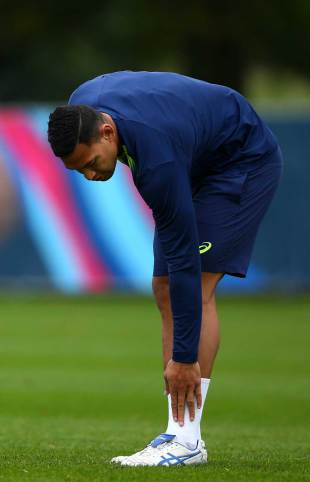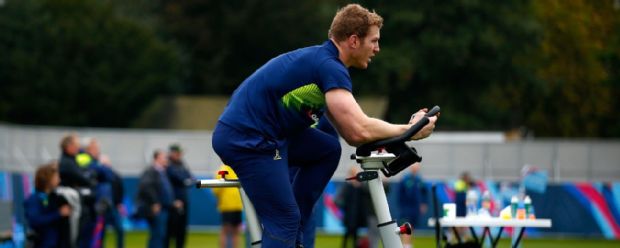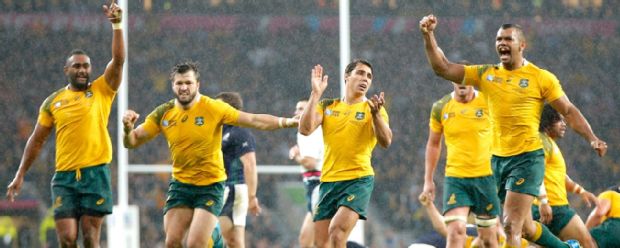|
Rugby World Cup
Simple presence and flare of Israel Folau changes shape of a game
Shannon Parry, Australia captain at the 2014 Women's Rugby World Cup
October 22, 2015
Which rugby player could star at the Olympics?
It is fair to say the southern hemisphere is dominating the Rugby World Cup. The performance by the New Zealand All Blacks definitely put them back to the top of the favourites' totem pole for the Webb Ellis Cup, but their semifinal opponents, South Africa, were far from convincing in defeating Wales. Argentina's powerful forwards and electric outside backs showed their class in a convincing win over Ireland, and they will provide a tough test for the Wallabies. Australia, meanwhile, progressed only after referee Craig Joubert's controversial penalty decision at the death, but it was positive to see the Wallabies play the full 80 minutes to scrape through. What did we learn about the Wallabies in their game against Scotland? 
Israel Folau checks his injured ankle
© Getty Images
Enlarge
Michael Cheika says the Wallabies may have got caught up in the hype of their pool wins against England and Wales, but that is no excuse for their performance. Scotland came out firing from the start, and it was evident they meant business. This quarterfinal just reiterates that there are no easy games in the knock stage of the tournament, regardless of form and reputations; teams can ill-afford slip ups at the pointy end of the tournament if they are to keep alive their dreams of lifting the Webb Ellis Cup. The loss of Israel Folau and David Pocock for this quarter final clash, I believe, had a significant impact on the performance of the Wallabies. Pocock's ability to create turnovers and slow down opposition ball had been crucial in previous games, and I note that my ESPN colleague Greg Growden suggests the Wallabies can't win the World Cup without him. Kurtley Beale held his own from the full-back position, but I feel the presence and flare of Folau would have changed some aspects of how the game unfolded. For the Aussies to match it with the Pumas, and to win their semifinal clash, I think Australia need these two players fit and playing.  David Pocock goes through the motions on an exercise bike© Dan Mullan/Getty Images We learned also that Australia's scrum, which is significantly improved, needs continued work if it is to be competitive against the other semifinalists. There had been a lot of talk about the dominance of the Australian scrum against England and Wales, but it was evident in the quarterfinal that Scotland had done their homework. Hence the Wallabies will be sweating on the fitness of Scott Sio, who has been an integral element to the success of the Australian scrum. If Sio is to be ruled out through injury, James Slipper will have to step up into the front row. We also learned the depth of the teamwork and character that Michael Cheika has created among the Aussie set up. At the end of the day, a win is a win and their ability to grind out victory against a very committed Scottish outfit, despite a performance far from their best, will provide a massive confidence boost. The substitutes or "finishers" as Cheika likes to call them, once again did their job, and I think there is immense confidence in the Australian bench - in that Cheika knows whoever takes to the field will do the job for the team. Also the fact that Australia competed for the full 80 minutes is a huge positive. Australia's defensive effort, the cornerstone of their game, was dominant again, even though Scotland scored three tries; the first resulted from disappointing ruck defence, but the other two came from Australian errors - a charge-down and an intercept. The Australian defence otherwise was strong, while the attack was heartening in that Australia scored five tries.  Australia celebrates victory against Scotland© Reuters/Andrew Couldridge What did the Wallabies learn about themselves?
I think the Wallabies will have gained defensive confidence from their efforts against Scotland, in their ability to stay connected and work as one unit to hold the brick wall strong. And they'll have developed further trust in each other after they were still able to grind out a victory against a very committed opposition when things weren't going 100% to plan. When it came down to the final stages of the game, and the Aussie were chasing the scoreboard, their game plan did not change. You could see that they still believed they could win the game, and they stuck to their structures and did not panic. Senior players stood up and Australia played till the final whistle. The Wallabies' display of patience and calm with only minutes on the clock - outwardly, at least - was incredible. When you are chasing the clock, it usually builds pressure and is hard to handle, but the result is more likely to happen if you have a team believing in one common goal and they believe in their abilities. Australia kicked penalty goals when they were available, and this will be crucial in the final two weeks of this tournament as we all know that every point counts. For Bernard Foley to step up and slot the match winner having missed previous conversions, it was incredible to see his confidence and calmness. It is moments like these that kickers dream of, and Bernard has proven on a number of occasions that he relishes these moments. His kicking will need to be of the same high calibre against Argentina. The Wallabies have created a winning culture, attitude and belief that will put them in good stead going forward. The winning culture is hard to develop, but once you get on a winning roll it is easier to get the team up for a game than when you are not winning. That said, Australia have learned they must not rest on the laurels of past results. And they know they will need to bring their "A" game from the kick off, and execute at the highest level, against the Pumas.
© ESPN Sports Media Ltd. Shannon Parry is an Australian Sevens player and captain of the Australian team that competed at the 2014 Women's Rugby World Cup.
|
Live Sports
Communication error please reload the page.
-
Football
-
Cricket
-
Rugby
-
- Days
- Hrs
- Mins
- Secs
F1 - Abu Dhabi GP
Abu Dhabi Grand Prix December 11-131. Max Verstappen ()
2. Valtteri Bottas (Mercedes)
3. Lewis Hamilton (Mercedes)
4. Alexander Albon ()
5. Lando Norris ()
6. Carlos Sainz Jr ()
-
ESPNOtherLive >>
Golf - Houston Open
Snooker - China Open
Tennis - Miami Open

